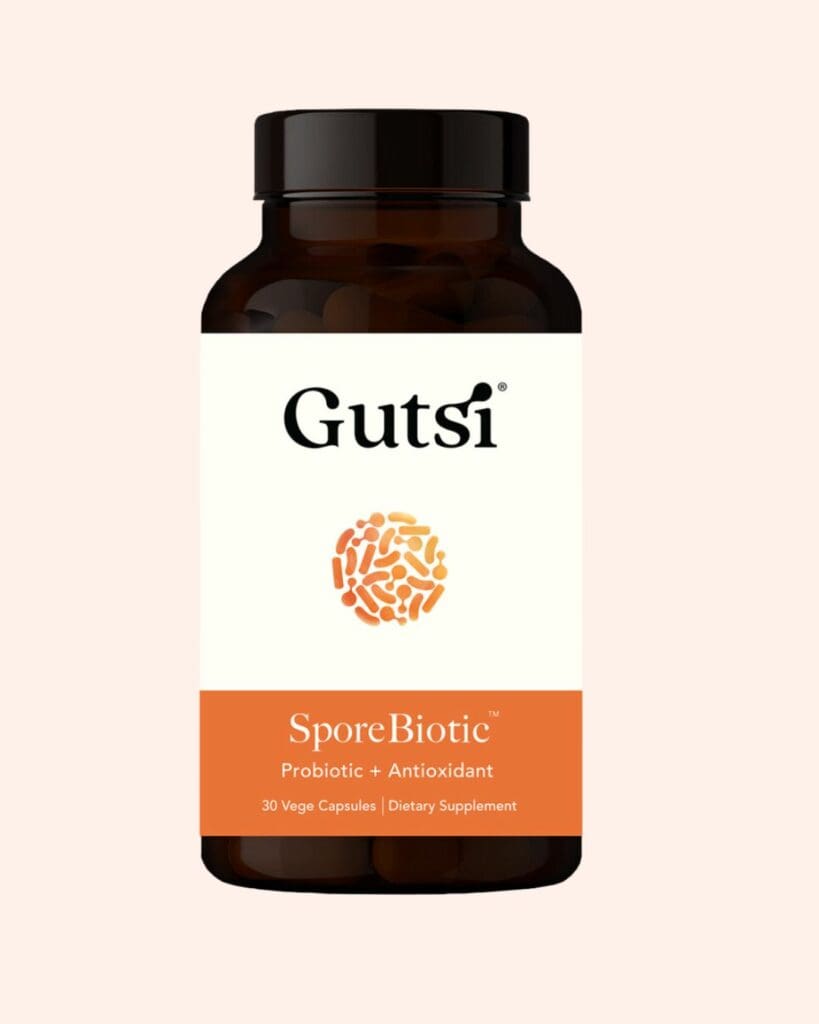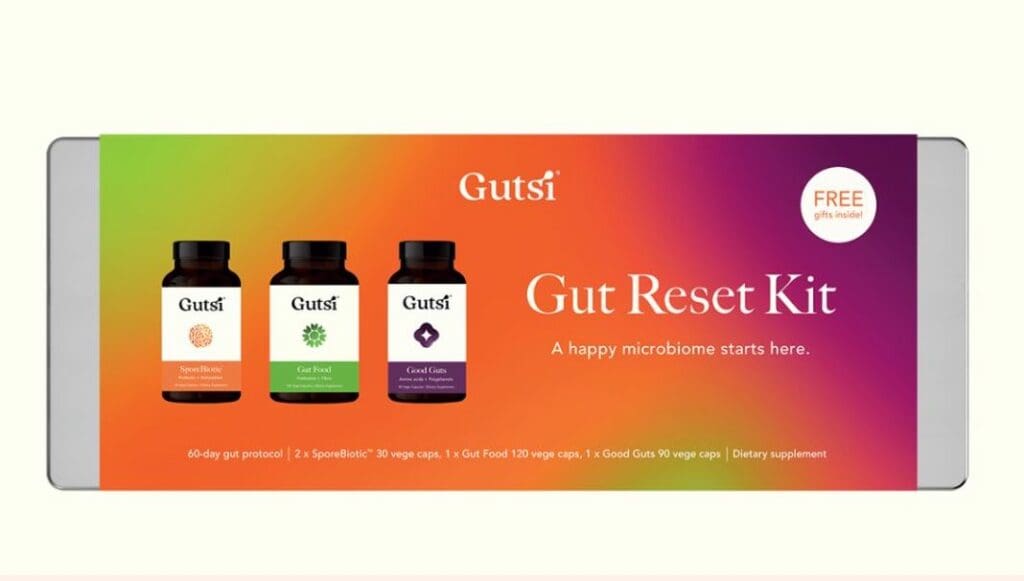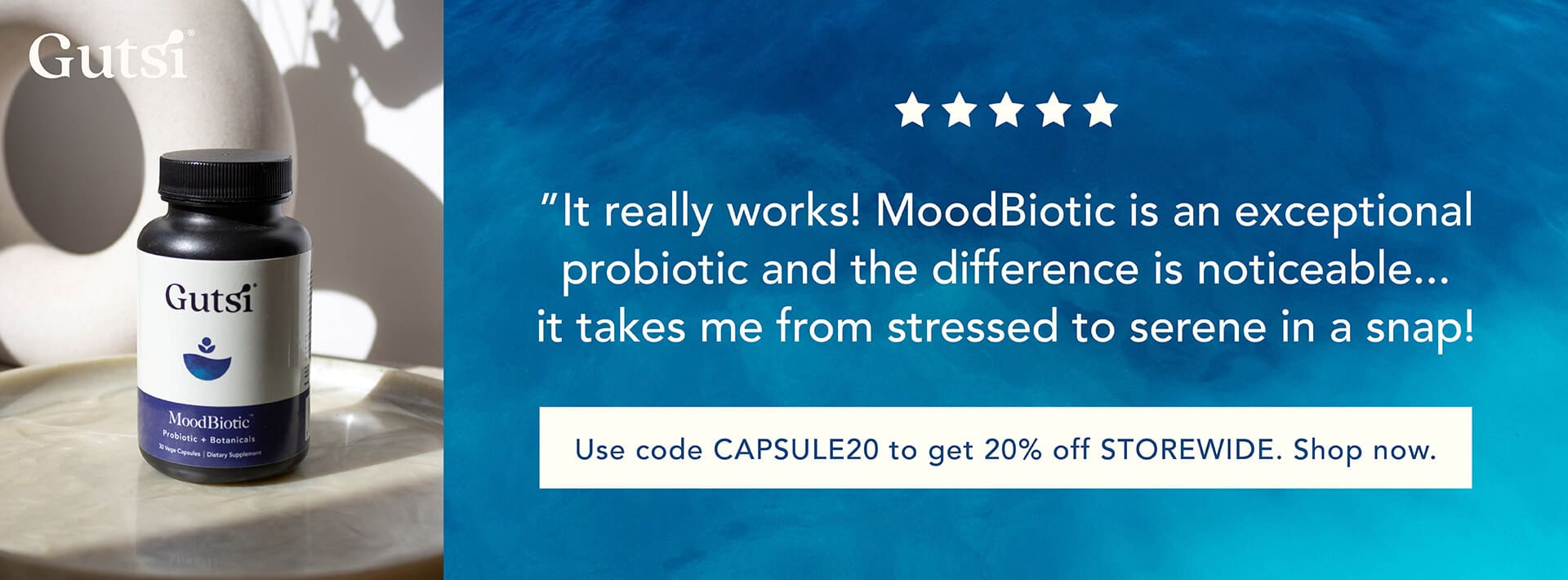This story is proudly brought to you in partnership with Gutsi
Us humans have always put a great deal of faith in our guts. How many times have you been told to ‘trust your gut’? Or, when faced with a major life decision, been asked, ‘what is your gut telling you to do?’
But, despite these sayings existing for eons, it’s only really been in the last decade or so that we’ve really learned just how important the gut really is, and how much responsibility it has in keeping our entire body and mind (yes, our minds too!!) healthy and well.
It turns out, the gut is responsible for around 80% of our immune system. And it doesn’t stop there – it actually informs everything from our nervous systems, to digestive functions, right through to our mental health. It’s pivotal in staying well.
And someone who knows a huge amount of the inner workings of gut health, is Jessica Sanders. Jess is a qualified naturopath and medical herbalist who has been in clinical practice for close to a decade. Previously to that, Jess – who hails from the US – gained a degree in psychology and worked primarily in the mental health field (something that actually has strong cross-over to the gut health world – but we’ll get to that a bit later!). Jessica is the Technical Manager at Gutsi, where she steers a lot of the education and content the company creates, as well as research and product development. And, she’s brilliant at what she does.
The Guts of It: Just How Important Is Our Gut Health?
In short? It’s essential! If you’re looking for how to live a longer, healthier life you’re going to want to read on, because the health of your gut has a massive impact on all areas of your health and wellbeing.
The gut is responsible for breaking down the foods we eat, absorbing nutrients that support the body’s functions. But it’s also home to our gut microbiome, which can literally affect every single organ in our body. In fact, the more we learn about the gut, the more we discover just how vital the role it plays is.
Wait. Back The Truck Up a Bit Please: What IS The Microbiome?!
Ok, look. Honestly, this is the hardest and most terrifying (and nauseating!!) thing to get your head around when it comes to us humans.
We all think of ourselves as one being, right? We’re a human being! We’re just one thing.
Well…. Unfortunately (or perhaps, fortunately!) that’s not actually the case.
See, we’re actually made up of trillions of different creatures – specifically bacteria. “In fact,” says Jessica, “we’re actually made up more bacteria than we are of our own human DNA”. Seriously. There are roughly 39 trillion microbes in the gut, so we have 360 times more bacterial genes than human genes.
We are more like walking, talking rainforests, who have a very complex ecosystem to look after within our bodies.
When we’re talking specifically about the microbiome, we’re also talking about that balance of bacteria. “More specifically,” explains Jessica, “We’re usually talking about the environment inside the large intestine – specifically, the trillions of bacteria that live there. There’s more bacteria in your gut than there are stars we can see in the Milky Way.”

And it’s specifically what types of bacteria we have in our guts – and at what numbers – that really has a profound impact on our health and wellbeing.
“Microbial diversity is super important,” says Jessica. “Essentially, the microbiome has both good and bad bacteria, which we also refer to as gut flora, that needs to be in balance. The body has a symbiotic relationship with the microbiome – it relies on some of the bacteria and the enzymes they create, to digest and produce other compounds in our body that we rely on. So, some bacteria may be harmful to our health, others are beneficial, but both actually need to be present for good health.”
How Do We Know if Something Isn’t Right in Our Gut?
Our gut is often trying to tell us something – and there are a number of different ways in which it might try to get across its message. Things like bloating, lethargy, trouble sleeping, issues with our skin, chronic pain, weight loss or gain, migraines, mental health issues… they (and a ton of other symptoms) could all be telling us that something is going on with our gut that is affecting our overall health. If our gut health, and our microbiome is out of whack – our whole system is out of balance.
“People often think that when we’re talking about your gut not being quite right, that it would just show up as bloating, diarrhea, wind, constipation or a lack of energy, but it’s so much bigger than that,” says Jessica.
There are also some very sobering stats out there when it comes to our gut health, meaning, it something we really can’t afford to ignore.
“In New Zealand alone, IBD (which includes ulcerative colitis, Crohn’s disease and IBS) is now as prevalent as type one diabetes,” says Jessica. “And the incidence of IBD in NZ is growing at a rate of 5.6% annually.”
It’s also affecting our children at an alarming rate.
“The National Institute of Health in America says that, based on Rome IV Criteria (which is a statistical measurement index they use for digestive disorders), 24.7% of infants (those aged zero to three) and 25% of children and adolescents (aged four to 18), have symptoms that qualify them for having gastrointestinal disorders or functional GI disorders. Which is pretty incredible to think that a quarter of all kids are potentially suffering from gut issues.”
So, How Do We Look After Our Gut and Microbiome?
How we live, really dictates what those populations of bacteria look like. One of the things that can really influence the balance is our diet.
“The good bacteria feed on things like fibre – both soluble and insoluble,” says Jessica. “We’re talking about things like vegetables and fruit here.”
Jessica says what we’re aiming for, is to have a wide, wide variety of fruits and vegetables in our diet – particularly nice leafy greens – and to have at least five portions of a variety of fruits and vegetables every day.
But she’s also realistic about it. “I rarely meet anyone eating a ‘perfect diet’ or consumes as many veges as we’re supposed to be eating – which is really saying something, I guess! There are other ways to get what you need though – make sure you include things like nuts, seeds and legumes in your diet. Things like cashews, walnuts, pumpkin seeds, black beans and lentils are all excellent sources of both fiber and protein to keep those good bacteria thriving.”
If you’re like us, and want to eat a broad range of fresh fruit and veges, but often get freaked out by the cost at the supermarket or vegetable shop till – Jessica says there are other alternatives. “Frozen veges – assuming that they don’t have other things added to them! – are perfectly fine and in fact, in some cases can be more helpful than fresh ones! They’re snap frozen when they’re at their most nutritious, which means you could be better off buying those, than eating the ones that have been sitting around in your fridge for a week or two!’
Now, switching over to those bad bacteria and the things that make those populations grow. Jessica says bad bacteria feed on things like simple sugars and processed foods. “This can be a hard one, because sugar is addictive!” she says. “Plus, processed foods are often much cheaper, so they’re an easier option!”
Jessica says we then want to look at probiotic and prebiotic foods, which help boost the population and diversity of good bacteria.
“Prebiotic foods include almonds, apples, bananas, flaxseed, broccoli, garlic and onions. Probiotic foods are usually your fermented foods – things like kimchi, kombucha and yoghurt.”
What Else Can We Do? Should I Be Taking a Probiotic?!
As Jessica said, in an ideal world we’d be getting everything we need from our diet (oh, and limiting our stress and getting eight hours every night) – but, how many of us are doing that? And, unfortunately, we may consume an ideal diet, but we can still be lacking in certain minerals (it can be particularly difficult to get enough selenium, zinc and vitamin D in NZ!).
That’s why it makes a lot of sense to get a helping hand in keeping our microbiome in check and it’s why a lot of people are now taking a probiotic.
“Probiotics are the fastest growing category in the supplement industry, and it’s with good reasons,” says Jessica. “PREbiotics are the ‘fertilizer’ for PRObiotics. Probiotics are often referred to as friendly or good bacteria – they are the good bacteria that help keep the normal healthy balance of the bacteria in your gut – specifically the lining of the gut, which includes the microbiome. This is how they influence the landscape of the gut environment.”
But, if you’ve stepped foot in a health store or pharmacy recently and checked out the range, you’ve likely quickly become overwhelmed. There’s so many different ones to choose from.
That’s where Gutsi comes in. They’re trying to cut through all that noise and offer up Kiwis a solution that’s easy, trusted and does the job it says it will. They’re a small NZ family-owned business, but have world-class formulas, which have been made with the help of world-renowned microbiologist and researcher Kiran Krishnan who is at the top of the field, internationally.
Their SporeBiotic™ is at the heart of the range and is a great place to start if you’re looking to really improve the health of your microbiome. It supports not just everyday wellness (we’re talking better energy, sleep, clearer skin and more here!), but is also perfect for those who have chronic digestive issues.


But what makes it stand out from the others on the shelf? Well, it works. It’s one of the only formulas that meets the National Institute for Health’s (NIH) criteria.
“The NIH defines probiotics on three criteria,” says Jessica. “So, they must contain organisms that are normally occurring in the digestive tract. They must be administered in quantities higher than what is normally in the digestive tract and the organism must be able to survive the digestive tract – and almost no probiotics in the marketplace in NZ meet all three of these criteria, but SporeBiotic™ does!”
It supports digestive, immune and total body health, whilst also supporting nutrient absorption to ensure you get the very best out of your diet! It also produces antioxidants at the most bio-available location in your body, turning your gut into your own little ‘antioxidant factory’.
You’ll find SporeBiotic™ on the shelf, not in the refrigerator – which is where you may be used to seeing your probiotics. But, Kiran Krishnan advises you stay away from the refrigerated items if you’re looking for a product that actually works. The point Kiran likes to hit home is that if your probiotic has to live in a fridge to survive, how on earth will it survive in your digestive tract where the conditions are hot, acidic and couldn’t be further from the environment in a fridge!
If you’re looking to get on top of your health this spring, Jessica recommends incorporating a SporeBiotic™ into your daily routine. Or, if you’re really looking for a ‘spring clean’ reset of your gut health, you can try the Gutsi Gut Reset Kit. It’s an advanced 60-day protocol that offers complete care for supporting the ultimate gut health transformation. It comes with three different products, plus a Gut Reset journal to track your progress – and a couple of free goodies! Plus, the team at Gutsi are on-hand to answer any questions that may come up during your journey and to offer their help and expertise.


For more info head to: www.gutsi.co.nz




